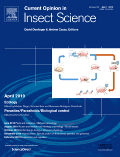
Current Opinion in Insect Science
Scope & Guideline
Transforming Perspectives in Insect Science
Introduction
Aims and Scopes
- Insect Development and Genetics:
Research focusing on the genetic and molecular mechanisms that influence insect development, including the role of microRNAs, hormonal regulation, and gene editing advancements. - Insect Behavior and Ecology:
Exploration of the behavioral aspects of insects, including social interactions, communication, decision-making, and responses to environmental factors. - Insect-Vector Interactions and Disease Ecology:
Studies examining the interactions between insects and their microbial symbionts, pathogens, and the implications for disease transmission and management. - Chemical Ecology and Plant-Insect Interactions:
Investigations into the chemical cues and interactions between plants and insects, including the role of phytochemicals in pest control and ecological dynamics. - Pest Management and Control Strategies:
Research on integrated pest management techniques, biological control, and the impact of environmental changes on pest dynamics and resistance. - Climate Change and Insect Responses:
Studies addressing the effects of climate change on insect populations, behavior, and ecology, focusing on adaptation and resilience.
Trending and Emerging
- Interdisciplinary Approaches to Insect Research:
There is a growing trend towards integrating fields such as neurobiology, molecular genetics, and computer science to provide a more comprehensive understanding of insect behavior and ecology. - Impact of Climate Change on Insect Dynamics:
Research focusing on how climate change affects insect populations, behaviors, and interactions is gaining prominence, reflecting the urgency of addressing environmental challenges. - Microbiome and Insect Interactions:
Studies exploring the role of microbial communities in influencing insect health, behavior, and ecology are on the rise, highlighting the importance of symbiotic relationships. - Advanced Genetic Techniques:
The use of gene editing and genomic tools to study insect development, behavior, and resistance mechanisms is increasingly prevalent, showcasing innovative methodologies. - Ecosystem Services Provided by Insects:
Research emphasizing the role of insects in ecosystems, particularly in pollination and pest control, is becoming more significant as conservation efforts intensify.
Declining or Waning
- Traditional Pest Control Methods:
Research on classical pesticide applications has decreased as the focus shifts towards integrated and sustainable pest management practices. - Simple Behavioral Studies:
There appears to be a decline in studies solely focused on basic behavioral observations without the integration of molecular or ecological contexts. - Generalized Taxonomic Studies:
While taxonomy remains important, there is a waning interest in purely descriptive taxonomic work, with a preference for studies that integrate genetics, ecology, and evolutionary implications. - Static Ecological Models:
The reliance on static models to predict insect behavior and population dynamics is declining in favor of more dynamic, data-driven approaches that consider multiple interacting factors.
Similar Journals
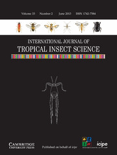
INTERNATIONAL JOURNAL OF TROPICAL INSECT SCIENCE
Connecting Scholars in Tropical Insect ScienceINTERNATIONAL JOURNAL OF TROPICAL INSECT SCIENCE, published by Springer International Publishing AG, is a leading interdisciplinary journal dedicated to advancing knowledge in the fields of insect science and ecology. With its ISSN 1742-7584 and E-ISSN 1742-7592, this journal provides a platform for researchers to publish high-quality, peer-reviewed articles that explore various aspects of tropical insect biology, behavior, and their ecological impacts. As evidenced by its Q3 ranking in both Ecology, Evolution, Behavior and Systematics and Insect Science, it plays a vital role in fostering scientific dialogue and innovation within these disciplines. Researchers affiliated with the journal benefit from its visibility and growing impact, as demonstrated by its Scopus ranks, with a percentile standing of 61st in Insect Science. Although the journal is not open access, it still reaches a wide academic audience, making significant contributions to our understanding of tropical ecosystems. Situated in Switzerland, this journal is crucial for students, professionals, and researchers invested in the intersection of entomology and ecological science.

EXPERIMENTAL AND APPLIED ACAROLOGY
Exploring Mite Science for Ecological and Health InnovationsEXPERIMENTAL AND APPLIED ACAROLOGY is a leading international journal that serves as a premier platform for the dissemination of cutting-edge research in the fields of Ecology, Insect Science, and Medical applications related to acarology. Published by Springer, this esteemed journal has been pivotal in advancing our understanding of mite-related science since its inception in 1985, and it anticipates continued publication until 2024. With an impressive ranking in the Q2 quartile across multiple categories, including Ecology (Rank #154/461) and Insect Science (Rank #42/181), it firmly establishes itself as a significant contributor to the scientific community. Although not an Open Access journal, its rigorous peer-review process ensures high-quality publication standards, appealing to researchers, professionals, and students alike. Aiming to bridge gaps between experimental research and practical applications, EXPERIMENTAL AND APPLIED ACAROLOGY plays a crucial role in enhancing knowledge and discoveries related to acarology, highlighting its vital importance in ecology and health sciences.
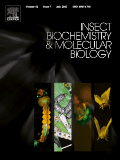
INSECT BIOCHEMISTRY AND MOLECULAR BIOLOGY
Pioneering Knowledge in Insect Biochemistry and GeneticsINSECT BIOCHEMISTRY AND MOLECULAR BIOLOGY, published by Pergamon-Elsevier Science Ltd, stands at the forefront of interdisciplinary research focusing on the biochemical and molecular processes in insects. This esteemed journal, with an ISSN of 0965-1748 and E-ISSN of 1879-0240, serves as a vital resource for scientists and researchers interested in the intricacies of insect physiology and genetics. With a significant presence in the academic community, it holds impressive rankings, including Q2 in Biochemistry and Q1 in Insect Science according to the latest quartiles, reflecting its critical role in advancing knowledge in these fields. The journal's convergence of content from 1992 to 2024 illustrates its commitment to fostering long-term scholarly discourse. Researchers will appreciate its impact within the Agricultural and Biological Sciences and its contributions to understanding the molecular biology of insects. Although not an open-access journal, it provides complementary insights into the biochemistry and genetics of insects, making it indispensable for anyone keen on pushing the boundaries of entomological science.

CANADIAN ENTOMOLOGIST
Bridging the Gap Between Insect Behavior and EnvironmentCanadian Entomologist, published by Cambridge University Press, is a prominent journal dedicated to the field of entomology, covering key areas such as insect science, ecology, and evolutionary biology. With its origins dating back to 1868, this esteemed journal has continuously contributed to the understanding of insect behavior, systematics, and physiology, engaging researchers and professionals alike. Although currently not an Open Access journal, it offers valuable insights through its rigorously peer-reviewed articles, reflecting its commitment to scientific excellence. The journal has garnered a respectable Q3 ranking in various categories, including Ecology, Evolution, Behavior, and Systematics, making it a critical resource for scholars and students who seek to explore the complex interactions within insect populations and their environments. Researchers can trust Canadian Entomologist to provide relevant and impactful research that shapes contemporary understanding in the realm of entomological studies, fostering the growth of this vital scientific discipline.

Austral Entomology
Advancing Knowledge in Insect Ecology and AgronomyAustral Entomology, published by Wiley, is a leading journal in the field of entomology, specializing in the study of insects within the wider context of agronomy, ecology, and evolutionary biology. With an impact factor that reflects its growing influence and a commendable H-Index, this journal serves a vital role in disseminating cutting-edge research that bridges the gap between basic entomological studies and applied agricultural practices. Since its inception in 2014, Austral Entomology has maintained a strong commitment to open access, fostering a collaborative environment for researchers and practitioners. Recognized within category quartiles Q2 across multiple fields such as Agronomy and Crop Science and Ecology, it ranks impressively among journals in Insect Science, showcasing the significance of its contributions to understanding insect behavior, ecology, and systematics. Given its robust accessibility options, the journal not only enhances the visibility of entomological research but also empowers professionals and students alike to engage with and apply findings in real-world contexts.
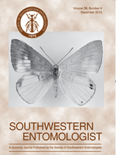
SOUTHWESTERN ENTOMOLOGIST
Innovating Solutions through Entomological ResearchSOUTHWESTERN ENTOMOLOGIST is a pivotal academic journal dedicated to advancing the fields of Agronomy, Ecology, and Insect Science. Published by the SOUTHWESTERN ENTOMOLOGICAL SOC in the United States, this journal plays a crucial role in disseminating vital research findings that address pressing ecological and agricultural challenges. With its ISSN 0147-1724 and E-ISSN 2162-2647, the journal has been publishing comprehensive studies since 1993 and continues to contribute significantly to the knowledge base up to 2024. As a Q4 ranked journal in both Agronomy and Crop Science and Ecology, as well as Insect Science, it provides an inclusive platform for researchers and students to share their insights and foster collaborations. Although it currently does not offer open access options, the content is accessible to academic institutions and professionals, ensuring that significant findings reach a broad audience. Given its niche focus, SOUTHWESTERN ENTOMOLOGIST not only appeals to researchers and students but also to professionals looking to stay updated on the latest trends and developments in entomology and its related fields.

REVISTA DE LA SOCIEDAD ENTOMOLOGICA ARGENTINA
Driving Discourse in Entomology and Environmental ScienceREVISTA DE LA SOCIEDAD ENTOMOLOGICA ARGENTINA is an esteemed open-access journal dedicated to the field of entomology, published by the SOCIEDAD ENTOMOLOGICA ARGENTINA. Since its transition to open access in 2013, the journal has sought to promote research in insect science, ecology, and related disciplines, facilitating global dissemination of knowledge and encouraging collaborative studies across borders. Located in the vibrant scientific landscape of La Plata, Argentina, the journal is indexed in Scopus and categorized in the fourth quartile of ecology and insect science, reflecting its commitment to enhancing the discourse within these critical fields. Aiming to bridge the gap between researchers, students, and professionals, REVISTA DE LA SOCIEDAD ENTOMOLOGICA ARGENTINA serves as a platform for innovative research, reviews, and reports on ecological interactions, behavior, and systematic entomology, ultimately driving forward our understanding of insect biodiversity and its broader environmental impacts.
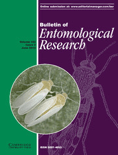
BULLETIN OF ENTOMOLOGICAL RESEARCH
Pioneering Research at the Nexus of Entomology and HealthBULLETIN OF ENTOMOLOGICAL RESEARCH, published by Cambridge University Press, is a prestigious journal that has been at the forefront of entomological research since its inception in 1910. With an impressive track record extending through to 2024, this journal serves as a vital platform for advancing knowledge in various related fields, notably Agronomy and Crop Science and Insect Science, where it ranks in the top quartile (Q2) and maintains a commendable position within the Scopus rankings in its categories. Notably, its contributions also intersect with Medicine in a broader scope, fostering interdisciplinary insights. While access to the journal content is not classified as 'Open Access,' its rigorous peer-reviewed articles are crucial for researchers, professionals, and students seeking to enhance their understanding of entomology and its applications in agronomy and beyond. The journal's impact is reflected in its notable percentile rankings, emphasizing its relevance and influence in the academic community. Located at the heart of the UK, the BULLETIN OF ENTOMOLOGICAL RESEARCH continues to be an essential resource for those dedicated to the study and understanding of insects and their impacts on agriculture and health.
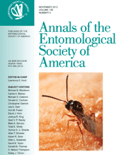
ANNALS OF THE ENTOMOLOGICAL SOCIETY OF AMERICA
Transforming Entomological Research Since 1938ANNALS OF THE ENTOMOLOGICAL SOCIETY OF AMERICA is a premier journal dedicated to advancing the field of insect science, published by Oxford University Press. With an impressive impact factor and classified in the Q1 quartile for its category, this journal ranks among the top publications in agricultural and biological sciences, specifically within insect science, positioned at #28 out of 181, indicating its significant influence and high-quality research contributions. The journal aims to disseminate original research, comprehensive reviews, and groundbreaking findings that enhance our understanding of entomology, spanning across ecological, evolutionary, and applied segments. With a consistent publication history since 1938, researchers, professionals, and students will benefit from the wealth of knowledge presented in its pages. Although the journal does not currently offer open access, it remains a vital resource for those seeking to stay at the forefront of entomological research and innovation.

REVISTA COLOMBIANA DE ENTOMOLOGIA
Unraveling Insect Mysteries for a Sustainable FutureREVISTA COLOMBIANA DE ENTOMOLOGIA, published by the SOC COLOMBIANA ENTOMOLOGIA-SOCOLEN, serves as a vital platform for disseminating research in the field of insect science. With an ISSN of 0120-0488, the journal has established itself as a key resource for entomologists, agricultural scientists, and biodiversity researchers, focusing on the ecology, taxonomy, and behavior of insects within the Colombian context and beyond. Despite its Q4 ranking in 2023, REVISTA COLOMBIANA DE ENTOMOLOGIA strives to enhance its impact within the academic community, offering a space for innovative studies and reviews that aim to advance the understanding of insect-related phenomena. As a publication addressing critical concerns in agricultural and biological sciences, it invites contributions that explore new methodologies and findings relevant to the insect world. Although it does not currently offer Open Access options, the journal's growth from 2004 to 2024 reflects its commitment to evolving with the needs of its readership and contributors, making it an essential reference point for students and professionals alike interested in entomological research.